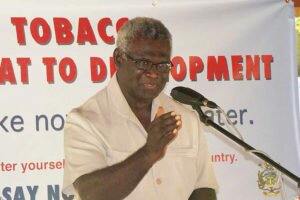PM warns of tobacco as threat health

Prime Minister delivering his keynote address during the marking of the World Tobacco Day yesterday in Honiara.
SMOKING contributes to some of the major diseases faced in the country.
And this is very obvious as around one third of the total population of Solomon Islands are smokers.
Prime Minister said this in his remark during the World Tobacco Day on Wednesday.
He said the development happening here as far as tobacco is concerned has resulted in sickness and death.
Hon Manasseh Sogavare said a recent data from the National Referral Hospital showed that cardiovascular diseases, heart attack and stroke are now the number one killers in the country.
And he made it clear that smoking has always been a predisposing factor to these diseases.
He added that Smoking is also a major risk factor to the development of cancer and where cancer is the number one cause of death in the women folk of this country.
Mr Sogavare said the development in the number of the country’s population as far as smoking is concerned is alarming with more than 31% of the population smoking, an increase in the uptake of the habit noted in women and youth
“Our youth rates are one of the highest youth smoking rates in the globe with 40% of our youth between the ages of 13-15 smoking
“Not only that but the non – smoking population are also very much affected with 80% of our youths exposed to second hand smoke
“Our hospitals around the country are now filled with people suffering tobacco-related diseases
“Our children, family and friends are dying. This is not the development that we want for our people, and I say that enough is enough.
“No longer will we entertain the notion that anything to do with tobacco can be good for us and our community,” he said.
Prime Minister highlighted that more than 7 million deaths from tobacco use every year, a figure that is predicted to grow to more than 8 million a year by 2030 without intensified action.
He pointed out that tobacco use is a threat to any person, regardless of gender, age, and race, cultural or educational background.
“It brings suffering, disease, and death, impoverishing families and national economies.
“Tobacco use costs national economies enormously through increased health-care costs and decreased productivity.
“It worsens health inequalities and exacerbates poverty, as the poorest people spend less on essentials such as food, education and health care,” Prime Minister said.
He said some 80% of premature deaths from tobacco occur in low- or middle-income countries, which face increased challenges to achieving their development goals.
And youth development has also become a victim of increased of tobacco use.


